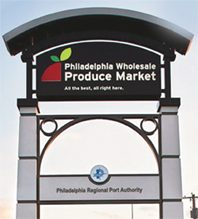Additionally, Curtis also sells a significant number of cases of ‘Maradol’ papaya each week. “I was the first person to bring Maradol papaya into Philadelphia twenty years ago from Mexico,” he laughs. “Nobody wanted to buy it then. Now we sell 400 cases a week.”
Penza at Pinto Bros. says premium mangos are getting more popular each year due to the growing Indian population that prefers fresh fruits and vegetables over frozen, processed, or canned. Other merchants across the market echoed much the same sentiment.
The Philly Advantage: Melding the Past, Present, and Future
For most merchants at the PWPM, the honeymoon is not over. They are a proud and confident bunch and cite many advantages to doing business at the Philly market.
Levin says a fresher or a better variety of produce is not available anywhere else, but more significant are the people. The market boasts twenty-five vendors, and all are produce experts.
Vena declares: “We have a dedicated core of very competitive merchants offering every product in season.”
The Philadelphia produce scene is certainly steeped in history. John Vena, Inc. was founded in 1919, by the current president’s grandfather. Joe Procacci started Procacci Bros. in 1948 as a tomato repacker but diversified in the 1960s by acquiring growing operations, which opened the door to other commodities.
M. Levin and Company, in its 107th year, is still family-owned and currently being run by its third and fourth generations. The fourth generation is entirely female—which differentiates the company from its competitors.
The produce industry used to be male dominated, but as Mark Levin points out, “these days there are more women joining the industry and it’s really a great thing. Women are highly capable of running successful businesses, and there will be more women entering the produce industry as time goes on.”
Levin further emphasizes the importance of understanding all facets of the industry. Each generation has taught the next about the importance of building and keeping relationships with people in different sectors of the trade. “There is always something new to be learned,” says the industry veteran.
Challenges
For Philadelphia’s terminal merchants, challenges ran the gamut from sourcing and spoilage to finding affordable transportation.
Procacci’s private labeling has gained focus in recent years, with retail partners taking about half of the company’s tomato business and more than half of its organic sales. “It’s a good thing and a bad thing,” Feighery says.



